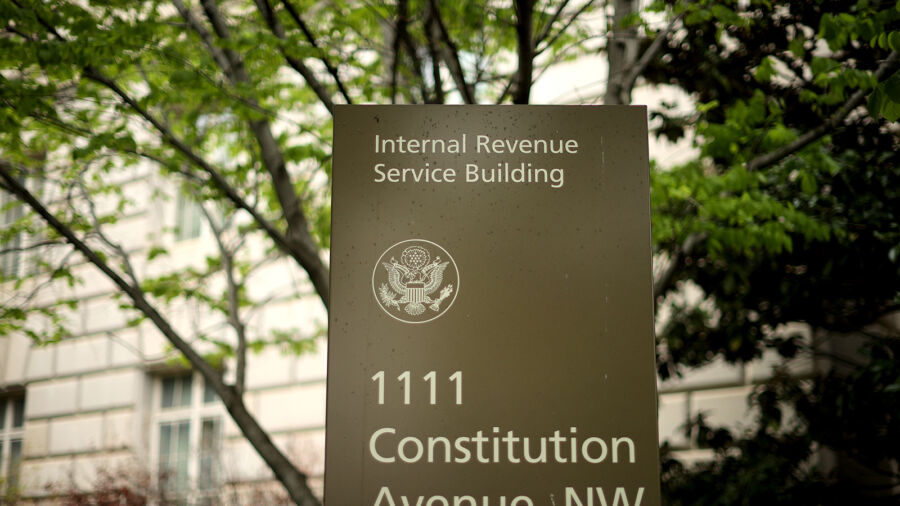A recent reminder from the Internal Revenue Service (IRS) for taxpayers to submit their tax returns, plus any owed payments, by the April 18 deadline, also included several strategies that people struggling to pay by the deadline can use to avoid or reduce penalties.
In a news release issued Thursday, the IRS reminded people about the looming April 18 deadline by which taxpayers are required to submit their returns along with any outstanding payments or face late filing and late payment penalties.
But the notice also included several methods that taxpayers can use to help them avoid penalties if they owe the IRS money but have trouble paying by the deadline.
Ask For a 6-Month Filing Extension
While the deadline to file a tax return falls on April 18, all taxpayers are eligible to apply for a six-month extension.
“An extension will help to avoid penalties and interest for failing to file on time, and gives taxpayers until Oct. 16, 2023, to file,” the IRS said in the notice.
Taxpayers who owe the IRS money but don’t request an extension and miss the April 18 deadline to file, face a failure to file penalty.
In terms of the failure to file a penalty, the IRS normally charges 5 percent of the unpaid tax due for each month that they’re late with the payment. The maximum late penalty will never be greater than 25 percent of one’s unpaid taxes.
Taxpayers can avoid a failure to file a penalty by filing their taxes by the original deadline or the extended deadline.
For those who don’t owe the IRS any money or have a refund coming, there is no penalty for failing to file a federal tax return by the deadline. This may not be the case for state taxes, however.
Still, there are a few good reasons to file a tax return even if no money is owed to the IRS.
Those who have a refund coming won’t get the money until they file and people who don’t file within three years of the original due date can lose the refund.
Also, the statute of limitations for the IRS to audit a tax return doesn’t start running out until a tax return is filed.
Failure to Pay
While filing for an extension can allow taxpayers to avoid getting hit with a failure to file penalty, they are still required to pay any taxes owed by the April 18 deadline.
For any unpaid amounts owed beyond the April 18 deadline, the IRS charges a failure to pay penalty of 0.5 percent of the tax owed per month. This, like a failure to file penalty, also caps at 25 percent of the tax due.
“Making a payment, even a partial payment, will help limit penalty and interest charges,” the IRS said in the note.
If both a failure to file and a failure to pay penalty are charged for a given month, then the failure to file penalty is reduced by the amount of the failure to pay penalty. This means that the combined penalty for a given month will never exceed 5 percent for each month or part of a month that the return was late.
While the failure to file penalty maxes out after 5 months (for a total of 25 percent), the failure to pay penalty continues until the owed tax is paid, up to a maximum of 25 percent of the unpaid tax.
The IRS reminder includes a tip that can allow taxpayers to cut the failure to pay penalty rate in half.
Taxpayers who cannot pay in full by the deadline can apply for a payment plan, including an installment agreement that allows them to pay off an outstanding balance over a period of time.
There’s an online resource called the Online Payment Agreement tool that taxpayers can use to set up a payment plan.
Once a taxpayer has set up an installment agreement with the IRS, the agency will reduce the failure to pay penalty to 0.25 percent of the tax due.
Finally, taxpayers can apply to the IRS for penalty relief.
The agency might agree to waive penalties for taxpayers who didn’t file on time or pay the taxes they owe under “reasonable cause” penalty relief provisions. Extenuating circumstances that might qualify a taxpayer for such relief include things like illness or natural disasters.
There’s also a “first time penalty abate and administrative waiver” process that could allow taxpayers to qualify for penalty relief even if they’ve missed a filing deadline or a payment due date.
Generally, this type of relief applies to taxpayers who have filed all their tax returns, paid their outstanding balances, or set up an installment agreement, and have not been subject to IRS penalties over the past three years.
The first-time penalty abate is discretionary, so the IRS is not required to grant the waiver. However, the agency may grant it as a one-time favor if the applicant has a good compliance history and meets program requirements.
From The Epoch Times

